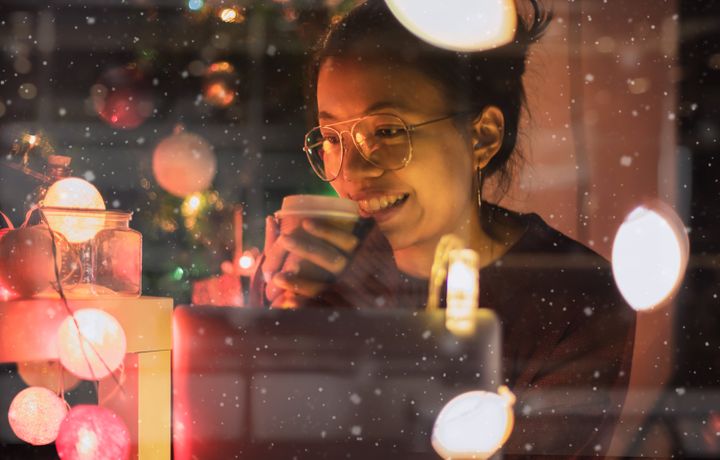[ad_1]
The time between Thanksgiving and New Year’s Day is typically peppered with social gatherings galore: family get-togethers, gift exchanges with friends and office holiday parties, to name a few. In 2020, however, the worsening pandemic has cleared most of these events from our calendars.
Many people understandably bemoan the cancellation of these celebrations — especially in a year when so much has been lost. But for people with social anxiety — a mental health condition that affects 15 million American adults — a quieter holiday season may come as a relief.
Illustrator Marzi Wilson, who has social anxiety, said her feelings about the holidays this year are mixed: On the one hand, she’s bummed to miss out on beloved traditions such as seeing “The Nutcracker” ballet and spending Christmas Eve with her parents. On the other hand, she can breathe a little easier knowing that she’s not expected to show up at parties or other social functions.
“The holidays always felt chaotic and overwhelming. There were parties to attend, presents to exchange and annual traditions I was expected to participate in,” Wilson — the woman behind the Instagram account Introvert Doodles — told HuffPost. “There were a couple of events every week in December, and attending all of them caused my anxiety levels to skyrocket.”
“There were a couple of events every week in December, and attending all of them caused my anxiety levels to skyrocket.”
– Marzi Wilson, illustrator
Social anxiety refers to an overwhelming and persistent fear of being judged or rejected in social situations that disrupts a person’s daily functioning, said clinical psychologist Aarti Gupta, founder and director of TherapyNest. In other words, the anxiety around these interactions may be intense enough that it interferes with school or job performance, relationships and other aspects of life.
While it’s possible to be both socially anxious and an introvert (like Wilson), the two terms are not synonymous and don’t necessarily go hand in hand.
“Introversion is a comparatively lower tolerance for social stimulation and drawing energy from blissful solitude or smaller-scale socializing ― there’s no avoidance, dread or fear,” said clinical psychologist Ellen Hendriksen, author of “How to Be Yourself: Quiet Your Inner Critic and Rise Above Social Anxiety.”
“Social anxiety, by contrast, is a mistaken perception that we have a fatal flaw — like, I’m awkward, I blush, I’m weird, I don’t have anything to say — that, unless we work hard to conceal it, will become obvious to others, and we’ll be judged or rejected for it,” she added.

Many social events crammed into the span of a few weeks bring the potential to be judged by co-workers or relatives the socially anxious don’t see or talk to often. This can lead to excessive worry about how they’ll be perceived and a sense of dread during what’s billed as a joyful time of year.
“For people who experience social phobia, these gatherings may feel like a place they will be judged or scrutinized by family members and acquaintances with whom they meet infrequently, causing a sense of doom as November rolls around,” Gupta said.
What’s especially challenging about holiday gatherings is their unstructured nature. Think: a work cocktail party where people are casually mingling. That adds uncertainty and ambiguity to the situation, Hendriksen said. A socially anxious person may wonder: Who should I talk to? What am I supposed to say? Am I being awkward or boring?
“Many individuals with social anxiety shine when they have a structured role to play, from performing onstage to giving a scripted presentation,” Hendriksen said. “But when there is no script, the resulting uncertainty drives anxiety.”
“Declining an invitation used to be perceived as selfish. Now it’s considered selfless.”
– Marzi Wilson, illustrator
Some of Gupta’s clients have expressed relief over the reduced number of social obligations this year. They’re content to spend the time at home or with a couple very close friends or relatives they feel most comfortable around.
As for Wilson, she said she plans to enjoy the quiet solitude of this holiday season — something she usually craves in other, busier years. And with fewer social encounters this winter — and throughout 2020 as a whole — she’s noticed her overall anxiety levels have decreased.
“Declining an invitation used to be perceived as selfish. Now it’s considered selfless. It’s a welcome relief from the guilt I sometimes felt when I chose to stay home,” she said.
If you’re someone with social anxiety, it’s OK to sit back and enjoy elements of a calmer holiday season. That said, you don’t want to let yourself become completely isolated. Consider taking whatever extra time you may have in light of your normal plans being canceled and channel it toward staying connected (even virtually) to the loved ones who matter most to you, Hendriksen suggested.
“While it’s totally fine to revel in the cancellation of your dreaded company holiday party, even the most introverted introvert is still a social animal who needs love, belonging and connection,” she said. “While this year you don’t have to use your energy on Bill from accounting, it’s still worth it to use it to connect with the people, near and far, you care about this holiday season.”
[ad_2]
Source link




















